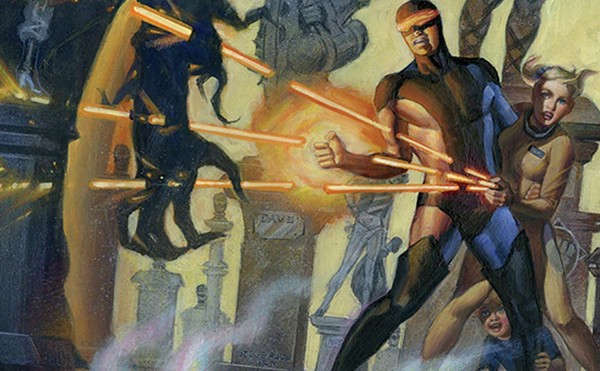A quarter of the way through The Flu Season, Will Eno’s 2003 absurdist exercise set in a psychiatric hospital, patients in the TV room watch a report on how an entire family fell through early-winter ice and died. Skating on a thin dramatic surface, the play itself hovers on the verge of its own destruction. Like Samuel Beckett’s novel Molloy, which concludes with the statement: “It was not midnight. It was not raining,” nullifying the earlier assertion: “It is midnight. The rain is beating on the windows,” The Flu Season performs a pas de deux between self-creation and self-negation.
Two metafictional figures, identified as Prologue (Sophie Bolles) and Epilogue (Stephen Poer), materialize at the beginning and, ignoring fourth-wall conventions, speak directly to the audience. Prologue is buoyant and rhapsodizes about the scene she sets for a play she calls The Snow Romance. But Epilogue, a jittery cynic, contradicts her and states that the play has been renamed The Flu Season. Prologue and Epilogue will repeatedly interrupt the proceedings with commentary. Prologue’s is exuberant and lyrical, immediately deflated by Epilogue’s tart disclaimers. “I’m sick of this story,“ Epilogue ultimately tells Prologue, “and I’m sick of you.”
The story, such as it is, involves a male patient, called Man (Nathan Thurman), and a female patient, called Woman (Kaitlin Graves), who meet and fall in love in the hospital. They are attended by an officious physician, called Doctor (Aaron Aguilar, who also directs), and a self-absorbed nurse, called Nurse (Halen George). Beyond that, a plot summary would be irrelevant, because verbal frolic is more important than events and because Epilogue – the author’s eraser – continually deletes what Prologue affirms and what we see on stage. “Life is a word game,” insists Epilogue, and, true to life in a loony way, The Flu Season, whose title is an ailing lark, is composed not of significant actions but verbal flummery and non sequiturs. “Buck teeth are buck teeth,” proclaims Nurse. “There’s only so much cocoa left,” declares Doctor, who is more deranged than his patients. ”That’s my philosophy.”
Since the fictional characters in the play are manifestly fictional characters, the challenge to Proxy Theatre’s talented cast is to make them not believable but memorable. For a suicidal soliloquy with echoes of Ophelia, Graves’ Woman stands out, as does Aguilar’s Doctor, especially when, swathed in bandages after a bee attack, he makes his drivel almost unintelligible. Epilogue asks: “It is entertaining to watch people in pain, yes?” Yes. Though The Flu Season skates over depression, rejection, loneliness, and death, it never quite falls through the ice. The spirited execution of lines and gestures that Epilogue pronounces “useless” generates a kind of morbid exhilaration.
In what might have brought down the curtain if there were a curtain marking off the minimalist set, Prologue, grievously disappointed in the turn her play has taken, finally announces: “The end.” But Epilogue immediately declares: “There is no end.” The players simply disappear, with no opportunity for the ovation they have richly earned. With this, the third production of its second season, an adventurous, audacious repertory company proves again that in San Antonio theater there is no substitute for Proxy.
The Flu Season
By Will Eno
Directed by Aaron Aguilar
$10-$25
8pm Thu-Sat
Proxy Theatre
The Little Overtime
1203 Camden
(210) 807-8646
proxytheatreonline.com
Through June 1


















